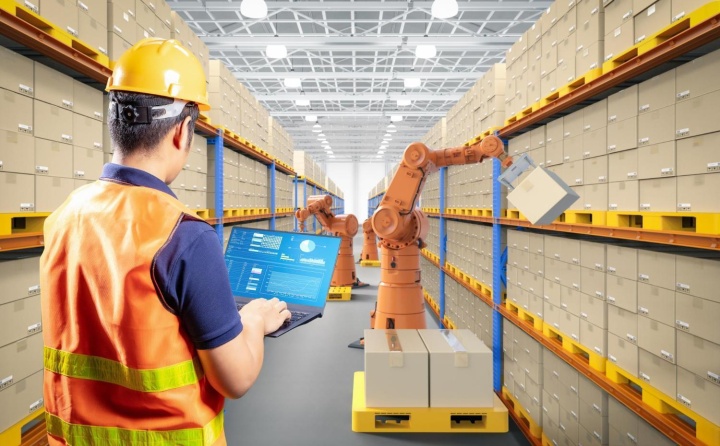

Japan Logistics Automation Market Size and Growth Overview (2025-2033)
Market Size in 2024: USD 5 Billion
Market Forecast in 2033: USD 17.6 Billion
Market Growth Rate 2025-2033: 15.1%
According to IMARC Group's latest research publication, "Japan Logistics Automation Market: Industry Trends, Share, Size, Growth, Opportunity and Forecast 2025-2033", the Japan logistics automation market size reached USD 5 Billion in 2024. Looking forward, IMARC Group expects the market to reach USD 17.6 Billion by 2033, exhibiting a growth rate (CAGR) of 15.1% during 2025-2033.
Download a sample PDF of this report: https://www.imarcgroup.com/japan-logistics-automation-market/requestsample
How AI is Reshaping the Future of the Japan Logistics Automation Market?
In Japan, they increasingly use artificial intelligence to automate logistics. This includes predictive analytics as well as real-time delivery decision-making and smart resource allocation. AI is also being used for warehousing operations, using algorithms to determine optimal stock locations and estimate demand. Machine learning models can analyze larger data sets, compare inefficiencies, and make recommendations for process improvement with important cost savings and greater efficiency. Equipment maintenance can be scheduled before failures happen, providing greater uptime throughout the distribution network.
AI-powered robotics creates advanced new generations of automated guided vehicles (AGVs) and autonomous mobile robots (AMRs) in warehouses. Robots can respond to changing warehouse environments more effectively since they can understand their environments better than ever because of computer vision and natural language processing (NLP). Deep learning in route optimization algorithms helps to ensure that products carried through a supply network are delivered most effectively, with minimum delivery time and transportation costs. Logistics automation systems are progressively becoming capable of performing even non-repetitive and high-level tasks, as deep learning technologies are improving.
Additionally, AI benefits customer experience because it fulfills orders better via systems that predict customer demand for a particular product, and deliver items the last mile in a more optimal way. AI can be used for running predictive analytics to forecast demand during peak seasons, thereby enabling resource allocation and supply chain optimization. IoT sensors and AI join to make a smart warehouse. The warehouse can adapt for continuous improvement. It provides a new standard for efficiency and precision in the logistics industry.
Japan Logistics Automation Market Trends & Drivers
The logistics automation market in Japan is rapidly evolving due to the growth of e-commerce, the convenience that logistics automation offers to consumers in terms of faster deliveries, and the availability of high-speed internet and mobile devices such as smartphones, which have brought about a change in the shopping behavior of consumers. With the advent of digital technology, it has become essential for companies to invest heavily in automation technology, such as loading and unloading containers, palletizing and de-palletizing and product flow along production lines.
The growth in Industrial Internet of Things (IIoT) and connected systems is expected to fuel the market further. These systems enable real-time tracking, monitoring, and optimization of logistics processes across industries. Organizations are beginning to realize the calculated importance of warehouse automation solutions as the number of distribution centers continues to grow worldwide. With increased use in advanced production technologies, automated guided vehicles and autonomous mobile robots have become critical components for companies to remain competitive within the logistics sector in Japan, as logistics systems continually improve in automation, enabling improved customer service and organizational control as well as reducing human misreadings and errors while allowing for greater scalability in the industry due to technical advancements.
Japan Logistics Automation Industry Segmentation:
The report has segmented the industry into the following categories:
Component Insights:
Function Insights:
Enterprise Size Insights:
Industry Vertical Insights:
Regional Insights:
Request a Customized Version of This Report for Deeper Insights: https://www.imarcgroup.com/japan-logistics-automation-market/requestsample
Competitive Landscape:
The market research report offers an in-depth analysis of the competitive landscape, covering market structure, key player positioning, top winning strategies, a competitive dashboard, and a company evaluation quadrant. Additionally, detailed profiles of all major companies are included.
Recent News and Developments in Japan Logistics Automation Market:
Future Outlook:
The Japan logistics automation industry is set for strong growth as businesses adopt advanced technologies to boost efficiency. The integration of AI, robotics, and IoT is transforming warehouse and supply chain operations. Labor shortages and rising costs are accelerating automation, while machine learning is enabling smarter, more adaptive systems. The market will continue expanding as companies focus on efficiency and customer satisfaction.
Key highlights of the Report:
Note: If you require specific details, data, or insights that are not currently included in the scope of this report, we are happy to accommodate your request. As part of our customization service, we will gather and provide the additional information you need, tailored to your specific requirements. Please let us know your exact needs, and we will ensure the report is updated accordingly to meet your expectations.
About Us:
IMARC Group is a global management consulting firm that helps the world's most ambitious changemakers to create a lasting impact. The company provides a comprehensive suite of market entry and expansion services. IMARC offerings include thorough market assessment, feasibility studies, company incorporation assistance, factory setup support, regulatory approvals and licensing navigation, branding, marketing and sales strategies, competitive landscape and benchmarking analyses, pricing and cost research, and procurement research.
Contact Us:
Street: 563-13 Kamien
Area: Iwata
Country: Tokyo, Japan
Postal Code: 4380111
Email: sales@imarcgroup.com
